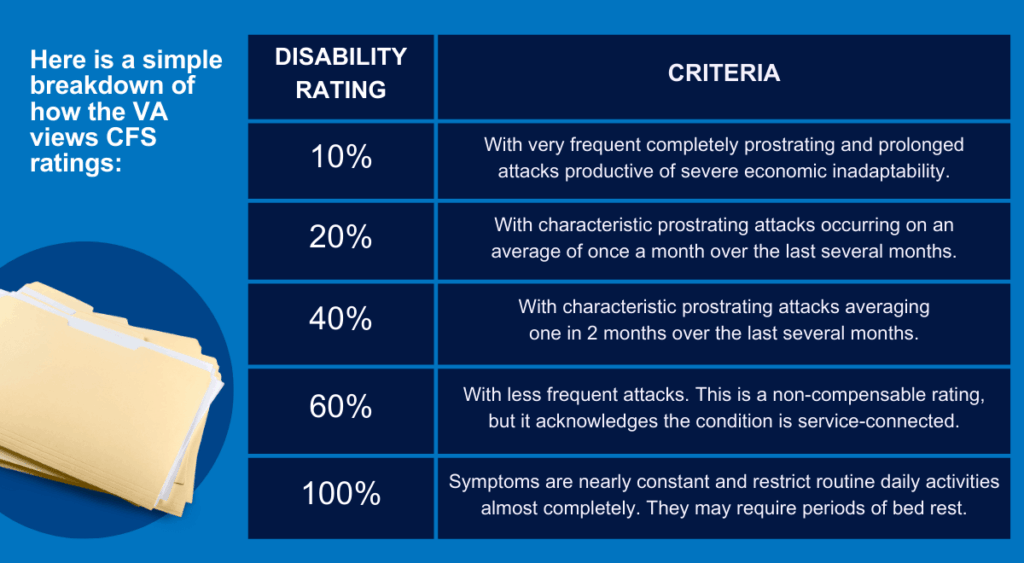You feel a bone-deep exhaustion that sleep never seems to fix. Your friends and family try to understand, but they cannot see your pain. To make matters worse, the VA might be treating your Chronic Fatigue Syndrome claim like it is all in your head. It is frustrating because CFS is often misunderstood. Here’s how AMG’s experts provide the clarity and proof the VA needs.
You are not imagining your symptoms. What you are going through is real, and you deserve recognition and support for it. We understand the wall you feel like you are hitting, especially when dealing with paperwork and exams. That is why we want to explain how we help when CFS is often misunderstood, and how our experts provide the clarity and proof the VA needs to approve your cfs claim.

Why Does the VA Get Chronic Fatigue Syndrome So Wrong?
Trying to explain Chronic Fatigue Syndrome to someone who has never experienced it can be challenging. You know the debilitating fatigue felt real and terrifying, but the words just do not capture it. This difficulty in communication is a major hurdle in the VA claims process.
Chronic Fatigue Syndrome, also known as Myalgic Encephalomyelitis (ME/CFS), is what doctors call a diagnosis of exclusion. This means they rule out every other possible illness before landing on a CFS diagnosis. There is not a single blood test or scan that screams, This is Chronic Fatigue Syndrome.
This lack of a simple diagnostic test is a big problem for your VA claim. The Veterans Affairs system is accustomed to seeing concrete evidence like X-rays of broken bones or lab results showing a clear disease. Your fatigue, cognitive dysfunction, and post-exertional malaise are invisible on those standard diagnostic tests. That is why your C&P examiner might doubt the severity of your condition or its impact on your daily life.
The core symptoms, such as unrefreshing sleep, severe muscle pain, and joint pain, are subjective experiences. Without clear medical documentation that explains these symptoms, the VA may incorrectly attribute them to other issues, including mental health conditions. This misunderstanding often leads to improper evaluations and claim denials.
Connecting CFS to Your Military Service
Getting your disability compensation approved requires one very important thing: establishing service connection. You have to show the VA that your CFS either started during your service, was caused by it, or was made worse by it. This can feel like a huge challenge years after you have taken off the uniform, but proving service connection is essential.
For many Gulf War veterans, the path can be a little more direct. The VA considers CFS a presumptive condition for veterans who served in the Southwest Asia theater of operations. This presumptive service connection means if your symptoms appeared before a certain date and meet specific criteria, the VA presumes your military service caused it.
This policy acknowledges that veterans exposed to environmental toxins and other hazards in places like Iraq and Afghanistan have a higher incidence of this illness. This can simplify the initial claim for many who served in the Gulf War. This is a critical aspect of understanding VA disability benefits for this condition.
But a presumption is not an automatic win for your CFS claims. You still need a current diagnosis and strong medical evidence showing the full impact of your symptoms. For service veterans who did not serve in that region, the burden of proof is even higher when establishing service connection. You have to build that bridge back to your service record and experiences, possibly linking it to high-stress environments or other in-service events.
How AMG Experts Provide the Clarity and Proof the VA Needs
This is where so many veterans get stuck in the claims process. You have the diagnosis, you know your life has been turned upside down, but you are not sure how to present that information in a way the VA will accept. Our independent medical experts know how to translate your experience into the language the VA understands.

We Build a Rock-Solid Medical Nexus
A Nexus Letter is probably the most powerful piece of evidence you can add to your claim. Think of it as a professional opinion from a doctor that directly links your CFS to your military service. A weak or generic letter from a healthcare provider who is unfamiliar with the VA’s requirements will not get the job done.
The medical professionals we connect you with review your entire file. They examine your service medical records, your post-service doctor visits, and any personal statements. They then write a detailed nexus opinion that clearly explains why it is at least as likely as not that your service is the cause of your fatigue syndrome.
This letter acts as the critical link that the VA rater needs to see. It provides a medical rationale that is based on your specific history. It moves your claim from being just your word against theirs to a medically substantiated argument for disability benefits.
Gathering the Right Evidence (Not Just More Evidence)
It is tempting to just throw a mountain of paperwork at the VA and hope something sticks. This approach usually just slows down your claim. The key is quality over quantity, and we help you find the right medical documentation.
Have your spouse write a buddy statement about the changes they have seen in you? That is great. But it is much more powerful if that statement gives specific examples of how CFS affects your daily life. Instead of saying, He is always tired, they could say, He used to coach our son’s baseball team, but now he has to rest for hours after just playing catch in the yard for 15 minutes.
Our experts help you identify these specific, impactful details that paint a clear picture of your limitations. They might also suggest certain medical opinions or records that can document your functional decline more clearly. This gives the VA rater a complete understanding of your disability, including issues like sleep disturbances and cognitive issues that are otherwise hard to prove.
Preparing You for the C&P Exam
The Compensation and Pension (C&P) exam is a major source of anxiety, and for good reason. A lot rides on that single appointment with a doctor who has never met you before. It is your chance to explain your condition, but it is easy to downplay your symptoms or forget important details when you are under pressure.
We help you prepare by talking through your symptoms and how to describe them accurately. The goal is not to exaggerate, but to be honest about your worst days, not just the days you feel relatively okay. The C&P examiner needs to understand how CFS limits your ability to work and live a normal life, so a full accounting of your symptoms is crucial.
This preparation includes discussing all your symptoms, from debilitating fatigue to tender lymph nodes. The examiner might ask about muscle pain, headaches, or difficulty concentrating. Being ready to provide clear, consistent answers helps ensure the final report accurately reflects your condition, which is a key part of securing VA benefits.
Common Pitfalls in a Chronic Fatigue Syndrome VA Claim
Veterans often face specific hurdles when filing a chronic fatigue syndrome VA claim. One common mistake is having incomplete or disorganized medical records. If there are large gaps in your treatment history, the VA may question the chronicity or severity of your condition.
Another pitfall is downplaying symptoms during the C&P exam. Many veterans have a “suck it up” mentality from their time in service, but this can be detrimental to their claim. It is important to be completely honest about how your symptoms, including cognitive issues and the need for rest, affect your daily functioning.
Finally, there is often confusion between CFS and mental health conditions like depression. While they can coexist, they are distinct diagnoses with different criteria. A strong claim will include medical evidence that differentiates your chronic fatigue syndrome from other conditions, ensuring it is rated correctly under the appropriate diagnostic code.
Understanding VA Ratings for CFS
Once your fatigue syndrome VA claim is service-connected, the VA will assign a disability rating. This rating, from 10% to 100%, determines your monthly compensation amount. The VA rates are based on a specific set of criteria outlined in the U.S. Code of Federal Regulations, specifically 38 CFR § 4.88b.
The VA rates CFS based on how often your symptoms flare up and how badly they restrict your daily activities. It is not just about feeling tired. It is about whether the condition forces you to reduce your activity, requires periods of rest, or puts you on bed rest for extended periods.
Here is a simple breakdown of how the VA views CFS ratings:

Looking at this table, you can see how important it is to document your limitations. A 10% VA rate might apply if medication keeps your symptoms manageable with minimal disruption. In contrast, higher VA ratings are assigned when the symptoms are severe enough to cause significant incapacitation.
A 60% rating is a major threshold, as it reflects a life where your daily activity is cut by more than half compared to before you got sick. To reach a 100% rating, your medical evidence must show that your symptoms are nearly constant and so restrictive that you are almost entirely unable to perform routine daily activities. Simply telling the VA you are tired is not enough; you need evidence showing that your CFS forces you to dramatically alter your life.
Conclusion
Your fight to get benefits for Chronic Fatigue Syndrome can feel lonely and exhausting, which is a cruel irony. You are already drained, and now you have to take on a massive bureaucracy. But you do not have to do it alone, and help from experienced healthcare providers can make all the difference.
The right expert medical evidence can be the difference between denial and approval. It gives the VA a clear, medically sound reason to grant your claim and recognize what you have lost because of your service. Your experience with CFS is real and deserves to be validated.
You understand that CFS is often misunderstood. Here’s how AMG’s experts provide the clarity and proof the VA needs so you can finally get the VA benefits you earned and deserve. Securing the proper VA rating can provide financial stability and access to necessary health care for your condition.

